Advaita Vedanta
This page was last revised on 8/21/25.
Snatana Dharma
Vedas
Upanishads
Brahma Sutras
Gitas
Sri Krishna
Adi Shankaracharya
Yoga Vasishta
Various
In Vedanta, the word Satyam (Reality) is very clearly defined and it has a specific significance. It means, that which exists in all the three periods of time (the past, present, and future) without undergoing any change; and also in all the three states of consciousness (waking state, dream state and deep-sleep state). This is, therefore, the absolute Reality, birthless, deathless and changeless referred to in the Upanishads as Brahman.
Snatana Dharma
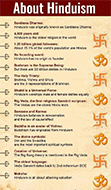 The most obvious misconception about Hinduism is that westerners tend to think it as just another religion.
The most obvious misconception about Hinduism is that westerners tend to think it as just another religion.
Snatan Dharma or Hinduism (as we know it today) is a way of life or Dharma. You do not convert, you just accept the Hindu way of life. Considering Hinduism as a religion is one of the most common misconception people have in today’s world. The word “Hindu” or “Hinduism” has no existence in ancient scriptures or texts. In fact, it was a term coined by foreign invaders.
To be more specific, it was used by the early inhabitants of Persia. They pronounced the name “Hindu” as it was the civilization that lived beyond the river Sindhu. The word Hindu and Hinduism thus have no origin from the land they truly belong to. Try asking around ten Hindus about the god they worship. You might get ten different answers to the same question and all of them will be surprisingly correct.
It is said that Hinduism has more number of Gods than any other religion in the world and that number is surprisingly more than the total number of Hindus. Another fascinating truth is that prior to arrival of Muslims and later on Christians, Hindus had no particular name by which they were called. Common people often called it just Dharma.
Snatana Dharma or merely Dharma was the term that was used in ancient scriptures. If we look into the entomology of the Sanatana Dharma, “Sanatana” means eternal and “Dharma” means Religion. If we look into other religions of the world, we can definitely track its origin or founder. But, this is not true in the case of Sanatana Dharma. Sanatana Dharma is eternal and universal in nature.
It is often referred to as the most ancient way of life or religion that is guiding millions of human beings till date. In Bhagavad-gita, As It Is, Srila Bhaktivedanta Swami Prabhupada has beautifully simplified the meaning of Snatana Dharma.
1) Hinduism is not a real name. This name was given by westerners. The real name is Snatana Dharma (eternal religion)
2) The foundation of this religion is based on Vedas.
3) There is no founder for this religion.
4) Vedas are timeless scripture.
5) It existed even before Indus Valley Civilization.
6) Vedas stats “Ekamevadvitiyam Brahma”(God is one alone without a second)
7) It believes in all religions as there can more than one path to reach the truth.It gives flexibility to people.It allows people to worship one god in different forms.It even gives space for atheistic philosophy.
8) And therefore earlier Pagan religion was nothing but Sanatana Dharma.
Hindu Snatan Dharma is Monotheistic, not Polytheistic.
The One Existence
THERE is one Infinite Eternal, Changeless Existence, the All. From That all comes forth; to That all returns. One only, without a second. That includes within Itself all that ever has been, is, and can be. As a wave rises in the ocean, a universe rises in the All. As the wave sinks again into the ocean, a universe sinks again into the All, As the ocean is water, and the wave a form or manifestation of the water, so is there one Existence, and the universe is a form, or manifestation, of the Existence. All this verily is Brahman.
~ SANATANA DHARMA. PART I. BASIC HINDU RELIGIOUS IDEAS
Hindu Snatan Dharma is Eternal, means it has no beginning & end. It ultimately teaches pure spiritualism which is a pure devotion to the Supreme Almighty God. It is 100% scientific since it teaches both - spiritual & material science. Since, the foolish westerners could not understand the transcendental subjects of our Hindu Vedic Snatan Dharma, they started calling our religion, a Hindu mythology. We must not use the word “mythology” for our religion, since our religion is 100% scientific. Our Hindu Sanatan Dharma ultimately rejects all lower religious principles & accepts the Spiritualism as the ultimate truth. This is explained by the Supreme Almighty God Shri Krishna in Bhagavad Gita - 18.66 - “Sarva dharman parityajya mam ekam sharanam vraja.” - “Abandon all varieties of religion & just surrender unto Me.” There are innumerable Gods & Goddesses to manage the different affairs of the universe. They all should be given a proper respect but one must worship only one & only one Supreme Almighty God. ~ SHRI KRISHNA (NARAYANA). The beauty of worshiping Shri Krishna is explained in Srimad Bhagavatam as follows:- “yathā taror mūla-niecanena
tpyanti tat-skandha-bhujopaśākhā
prāopahārāc ca yathendriyāā
tathaiva sarvārha am acyutejyā”
(Srimad Bhagavatam 4.31.14) “By giving water to the root of a tree one satisfies its branches, twigs and leaves, and by supplying food to the stomach one satisfies all the senses of the body. Similarly, by engaging in the transcendental service of the Supreme Almighty God SHRI KRISHNA (NARAYANA) one automatically satisfies all the Devi, Devata and all other living entities.
Sanatana Dharma consider the Vedas to be apauruṣeya, which means “not of a man, superhuman” and “impersonal, authorless”. Vedas and Upanishads are not created through the human logical thought process. Those few beings who raised themselves to vibrate in the very frequency of the Cosmos, the very frequency of the Brahman, Universe, they disappeared into that.
When their “I” disappeared into the cosmic vibration, whatever truths they received, whatever truths oozed out and expressed through them, they got recorded as Vedas and Upanishads. Those rishis understood clearly that the revelations came from a space where no “I” existed. That is why they very clearly decided not to own those truths even by claiming authorship.
This core characteristic makes Upanishads as a very authentic scripture. When the Rishis expressed it, the only context to express was articulate the truths (satya) for humanity and there was absolutely no trace of vested interest or greed mixed in that. There is no discussion of “For Profit” or “Non-Profit” ideas - Just they did not record their names.
Vedas
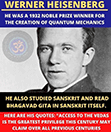
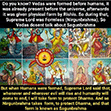 Vedas means knowledge in Sanskrit and Hindus consider the Vedas to be apauruseya, which means not of man, impersonal, authorless revelations of sacred sounds and texts. There are four Vedas: the Rigveda (oldest), the Yajurveda, the Samaveda and the Atharvaveda.
Vedas means knowledge in Sanskrit and Hindus consider the Vedas to be apauruseya, which means not of man, impersonal, authorless revelations of sacred sounds and texts. There are four Vedas: the Rigveda (oldest), the Yajurveda, the Samaveda and the Atharvaveda.
Tatvamasyadilaksyam
The four Vedas proclaim four mahavakyas or fundamental truths which are:
(1) Prajnanam Brahma * God is Pure Consciousness.
(2) Ayam Atma Brahma ** Atma (the Self) and Brahman (God) are one.
(3) Aham Brahmasmi *** I am God.
(4) Tat Twam Asi **** That thou art!
Atharva Veda
Strive to move away from untruth towards truth.
Rig Veda
Sing the song of celestial love, O singer!
May the divine fountain of eternal grace and joy enter your soul.
May Brahma, (the Divine One),
Pluck the strings of your inner soul with His celestial fingers,
And feel His own presence within.
Bless us with a divine voice
That we may tune the harp-strings of our life
To sing songs of Love to you.
~ Rig Veda
The cosmic order is controlled by a fundamental moral principle. An eternal law or unity, which can be conceived as the principle of rightness or justice, regulates all phenomena. In the Veda, this is called “Rtam”, which means the fixed way or course, in other words, the settled order of things. The whole universe is founded on Rtam and moves in it. It keeps all things and beings in their respective courses. Consequently nothing deviates from its own nature. Because of Rtam, fire burns, wind blows, water flows, plants grow and the seasons revolve. Rtam maintains regularity in the movements of the Sun and Moon, the planets and other luminaries. It manifests itself as the universal law of causation which finds expression in the human plane as the law of Karma. It establishes unity between the Cosmic forces and the individual powers. It is the basis of all laws, physical, biological, psychical, moral and spiritual. Rtam regulates Dharma, the principle of equity, the moral law that governs human life. because of this, right deed inevitably produces good result whereas wrong deed leads to evil consequences. There is no unmerited happiness or misery, gain or loss in man's life.
~ Rig Veda
There is an endless net of threads throughout the universe. The horizontal threads are in space. The vertical threads are in time. At every crossing of the threads, there is an individual, and every individual is a crystal bead. At every crystal bead reflects not only the light from every other crystal in the net, but also every other reflection throughout the entire universe.
~ Rig Veda
GOD IS PURE BLISS
The Embodiment of Supreme Bliss,
The Embodiment of Transcendental Happiness,
The Embodiment of Transcendental Wisdom,
The One beyond duality,
The One in Eternal Bliss,
The Embodiment of Oneness,
The Supreme One, The Eternal One,
The Unsullied One, the Ever-steady One, and
The Eternal Witness.
In the Anandavalli portion of the Rig Veda, there is a beautiful and poetic reference to Brahmananda or Supreme Bliss. Brahmananda refers to bliss that is limitless and beyond description by words; it is also something that cannot be comprehended by the ordinary mind. Unless one leads a calm, pure, noble, virtuous, peaceful, and unsullied life, one can neither understand nor experience this Brahmananda. Supreme bliss is beyond the physical, mundane, and transient world.
Yajur Veda
O seeker, know the true nature of your soul, and identify yourself with it completely.O Lord, (may we attain) the everlasting consciousness of Supreme Light and Joy. May we resolve to dedicate our life to the service of humankind, And uplift them to Divinity.
~ Yajur Veda
The one who loves all intensely
begins perceiving in all living beings
a part of himself.
He becomes a lover of all,
a part and parcel of the Universal Joy.
He flows with the stream of happiness,
and is enriched by each soul.
~ Yajur Veda
The universe is the outpouring of the majesty of God, the auspicious one, radiant love. Every face you see belongs to Him. He is present in everyone without exception.
~ Yajur Veda
Truth can not be suppressed and always is the ultimate victor.
~ Yajur Veda
Upanishads
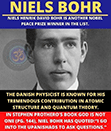
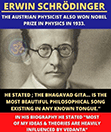 In the whole world there is no study ... so beneficial and so elevating as that of the Upanishads ... (they) are products of the highest wisdom ... It is destined sooner or later to become the faith of the people ... The study of the Upanishads has been the solace of my life, it will be the solace of my death. In the whole world there is no study ... so beneficial and so elevating as that of the Upanishads ... (they) are products of the highest wisdom ... It is destined sooner or later to become the faith of the people ... The study of the Upanishads has been the solace of my life, it will be the solace of my death.
~ Arthur Schopenhauer
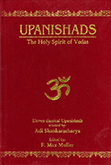 The fourth and youngest and last subcategory of each of the four Vedas are the Upanishads. Upanishad is derived from the words upa (near) and shad (to sit) as in sitting at the feet of a master. The fourth and youngest and last subcategory of each of the four Vedas are the Upanishads. Upanishad is derived from the words upa (near) and shad (to sit) as in sitting at the feet of a master.
Amritbindu Upanishad
Brihadaranyaka Upanishad
Chandogya Upanishad
Isa Upanishad
Kaivalya Upanishad
Katha Upanishad
Kena Upanishad
Maitreya Upanishad
Mandukya Upanishad
Mundaka Upanishad
Nādabindu Upanishad
Svetasvatara Upanishad
Tejobindu Upanishad
The Jiva, or individual, is none but Brahman, but because of identification with the body, mind and senses he looks upon himself as different from Brahman and as a limited being, subject to joys and sorrows caused by external factors. This identification with the body, mind and senses is what is called bondage. In reality the Jiva is the pure Brahman and is different from the body - mind complex. When this truth is realized as an actual experience, the identification with the body - mind complex ceases. This is liberation. Thus liberation is not the attainment of a state which did not exist previously, but only the realization of what one has always been. The illusory snake never existed. What existed even when the snake was seen was only the rope. Similarly, bondage has no real existence at all. Even when we are ignorant of Brahman and think of ourselves as limited by the body, we are really none but the infinite Brahman. Liberation is thus only the removal of the wrong identification with the body, mind and senses. The attainment of the state of liberation - in - life or Jivanmukti is the goal of human life according to the Upanishads.
~ S. N. Sastri
As is the human body, So is the cosmic body. As is the human mind, So is the cosmic mind. As is the microcosm, So is the macrocosm. As is the atom, So is the universe.
As the sun, revealer of all objects to the seer, is not harmed by the sinful eye, nor by the impurities of the objects it gazes on, so the one Self, dwelling in all, is not touched by the evils of the world.
Even as water becomes one with water, fire with fire, and air with air, so the mind becomes one with the Infinite Mind and thus attains final freedom.
In the finite there is no happiness. The Infinite alone is happiness.
Like two birds of golden plumage, inseparable companions, the individual self and the immortal Self are perched on branches of the selfsame tree. The former tastes of the sweet and bitter fruits of the tree; the latter, tasting of neither, calmly observes.
Never during its pilgrimage is the human spirit completely adrift and alone. From start to finish its nucleus is the Atman, the god-within... underlying its whirlpool of transient feelings, emotions, and delusions is the self-luminous, abiding point of the transpersonal god. As the sun lights the world even when cloud-covered, “the Immutable is never seen but is the Witness; it is never heard but is the Hearer; it is never thought but is the Thinker; it is never known but is the Knower. There is no other witness but This, no other knower but This.
That which is not comprehended by the mind but by which the mind comprehends - know that.
The bird has no path; where the bird flies is the path. The fish has no path in water; wherever it swims is the path.
The little space within the heart is as great as the vast universe.
The heavens and the earth are there,
and the sun and the moon and the stars.
Fire and lightening and winds are there,
and all that now is and all that is not.
The Self is hidden in the lotus of the heart. Those who see themselves in all creatures go day by day into the world of Brahman hidden in the heart. Established in peace, they rise above body-consciousness to the supreme light of the Self. Immortal, free from fear, this Self is Brahman, called the True. Beyond the mortal and the immortal, he binds both worlds together. Those who know this live day after day in heaven in this very life.
The Spirit is beyond sound and form, without touch and taste and perfume. It is eternal, unchangeable, and without beginning or end; indeed above reasoning. When consciousness of the Spirit manifests itself, man becomes free from the jaws of death.
To apply any description to the Supreme Soul is to limit and bind that which is limitless and boundless. All we can say is that the Absolute Reality is satyam, (Truth), jnanam (Consciousness) and anantam, (Infinite).
His essential nature is sat-chit-ananda: (Sat) Absolute Being – He encompasses everything because there is nothing outside of him; (Chit) Absolute Consciousness – He is the complete consciousness who has Absolute Knowledge; and (Ananda) Absolute Bliss – He is eternal joy and no suffering.
– A beautiful and profound description of God found in the Upanishads (dating ~800 BC); as translated by S. Radhakrishnan
We are like the spider. We weave our life and then move along in it. We are like the dreamer who dreams and then lives in the dream. This is true for the entire universe.
~ The Upanishads
Atma Upanishad
Next the supreme Self, the imperishable, He is to meditated on with (the help of) the Yogic steps, breath control, withdrawal (of sense organs), fixation (of mind), contemplation and concentration, He is to be inferred by the thinkers on the Self as like unto the seed of the Banyan tree or a grain of millet or a hundredth part of a split hair. (Thus) is He won and not known. He is not born, does not die, does not dry, is not wetted, not burnt, does not tremble, is not split, does not sweat. He is beyond the gunas, is spectator, is pure, partless, alone, subtle, owning naught, blemishless, immutable, devoid of sound, touch, colour, taste, smell, is indubitable, non-grasping, omnipresent. He is unthinkable and invisible. He purifies the impure, the unhallowed. He acts not. He is not subject to empirical existence.
Amritbindu Upanishad
 That in whom reside all beings and who resides in all beings, who is the giver of grace to all, the
Supreme Soul of the universe, the limitless being - I am that.
That in whom reside all beings and who resides in all beings, who is the giver of grace to all, the
Supreme Soul of the universe, the limitless being - I am that.
Brihadaranyaka Upanishad
 Shukla Yajur Veda: He who knows this, having become peaceful, controlled, detached, patient and concentrated, sees the atman in himself and sees all in the atman. Evil does not overcome him, but he overcomes all evil; evil does not consume him, but he consumes all evil. Free from evil, free from passion, free from doubt, he becomes a knower of Brahman.
Shukla Yajur Veda: He who knows this, having become peaceful, controlled, detached, patient and concentrated, sees the atman in himself and sees all in the atman. Evil does not overcome him, but he overcomes all evil; evil does not consume him, but he consumes all evil. Free from evil, free from passion, free from doubt, he becomes a knower of Brahman.
All the joys of the entire cosmos put
together would be only a small drop of the bliss of the
Supreme Being. Whatever little satisfaction we have, whatever
pleasures we have, whatever joys we are experiencing,
whatever be the happiness of life - all this is but a
reflection, a fractional distorted form, a drop, as it were,
from this ocean of the Absolute.
~ BRIHADARANYAKA UPANISHAD
Dialogue from Brihad-Aranyaka Upanishads:
“Ushasta Chakrayana questioned him (Yajnavalkya): “Yajnavalkya”, said he, “Explain to me him who is the Brahma present and not beyond our ken, him who is the soul in all things”.
“He is your soul, which is in all things”.
“Which one, O Yajnavalkya, is in all things”
“He who breathes in your breathing-in (prana) is the Soul of yours which is in all things."
He is never heard, but is the
Hearer;
He is never thought of, but is the Thinker;
He is never known but is the Knower.
There is no other seer than He,
there is no other hearer than He,
there is no other thinker than He,
there is no other knower than He.
He is your Self, the Inner Controller, the Immortal.
Everything else but Him is perishable.
v
He is never seen, but is the Seer.
~ Brihadaranyaka Upanishad
When the body and mind grow weak, the
Self gathers in all the powers of life and descends with them
into the heart. As prana leaves the eye, it ceases to see.
"He is becoming one," say the wise; "he does not see. He is
becoming one; he no longer hears. He is becoming one; he no
longer speaks, or tastes, or smells, or thinks, or knows." By
the light of the heart the Self leaves the body by one of its
gates; and when he leaves, prana follows, and with it all the
vital powers of the body. He who is dying merges in
consciousness, and thus consciousness accompanies him when he
departs, along with the impressions of all that he has done,
experienced, and known.
~ Brihadaranyaka Upanishad
Chandogya Upanishad
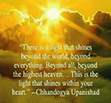 You Are Pure Existence. You Are Pure Existence.
In the sixth chapter of the Chandogya Upanishad, we find a dialogue between a sage and his son, Shvetaketu. The enquiry here is, ‘What is that knowledge by which everything becomes known?’
When we enquire deeply enough, this Upanishad claims, we shall see that all existent things are nothing but existence itself or pure existence. Sat is the term used for pure existence.
One who meditates upon and realizes the Self discovers that everything in the cosmos - energy and
space, fire and water, name and form, birth and death, mind and will, word and deed, mantram and meditation - all come
from the Self.
The Self is one, though it appears to be many. Those who meditate upon the Self and realize the Self go beyond decay
and death, beyond separateness and sorrow. They see the Self in everyone and obtain all things.
Control the senses and purify the mind. In a pure mind there is constant awareness of the Self. Where there is
constant awareness of the Self, freedom ends bondage and joy ends sorrow.
Thus the sage Sanatkumara taught the pure Narada to go beyond bondage, beyond sorrow, beyond darkness, to the light
of the Self.
~ Chandogya Upanishad Chapter 7
The Self resides within the lotus of
the heart. Knowing this, consecrated
to the Self, the sage enters daily
that holy sanctuary. Absorbed in
the Self, the sage is freed from
identity with the body and lives
in blissful consciousness.
~ Sama Veda, Chandogya Upanishad 8.3.3-4
Where one sees nothing else, hears nothing else, understands nothing else, that is the infinite. But where one sees something else, hears something else, understands something else, that is the small (ie. the finite). Verily, the infinite is the same as the immortal, the finite is the same as the mortal.
~ Chandogya Upanishad, VII.24.1
Isa Upanishad
The Isa Upanishad says He is within all: "In the heart of all things, of whatever there is in the universe, dwells the Lord." Whatever we experience, whether through the inner or outer senses, it is a covering of the Lord (Isha).
All is perfect, so perfectly perfect!
Whatever being lives, moves and breathes on earth, at every
level from atom to galaxy, is absolutely perfect in its
place. Precise and choreographed. Because ‘That’ flows from
the Glory of God, The Lord, Consciousness, The Source,
Awareness, Peace and Love, and is therefore perfect. When you
have surrendered your ego To 'That’ you will find true
happiness.
~ Isa Upanishad
3. To the seer, all things have verily become the Self: what delusion, what sorrow, can there be for
him who beholds that oneness?
~ Isha Upanishad
He who sees everything and all beings in the Atman (Self), and the Atman (Self) in all beings, feels no hatred by virtue of that realization.When, to the man of realization, all beings become one with his own Atman, his own Self, then what delusion and what sorrow can there be for that seer of oneness? When one sees all beings in the Self, and the Self in all beings, he hates no one.Renunciation is renunciation of the ego, of selfishness and not of life.Who sees all beings in his own Self and his own Self in all beings, loses all fear.The whole creation is filled with Divinity.
TEACHINGS FROM ISHA UPANISHAD
INFINITE O Almighty! You are the infinite; the universe is also infinite! From infinite the infinite has come out! Having taken infinite out of the infinite, the Infinite remains! O Almighty! May there be Peace! Peace! Everywhere.
~ Ishawashya Upanishad
Kaivalya Upanishad
Meditating on the lotus of your heart, in the center is the untainted; the exquisitely pure, clear, and sorrowless; the inconceivable; the unmanifest, of infinite form; blissful, tranquil, immortal;
the womb of Brahma.
Katha Upanishad
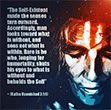 Death said: 'God made sense turn outward, man therefore looks outward, not into himself. Now and again a daring soul, desiring immortality, has looked back and found himself. The ignorant man runs after pleasure, sinks into the entanglements of death; but the wise man, seeking the undying, does not run among things that die.
Death said: 'God made sense turn outward, man therefore looks outward, not into himself. Now and again a daring soul, desiring immortality, has looked back and found himself. The ignorant man runs after pleasure, sinks into the entanglements of death; but the wise man, seeking the undying, does not run among things that die.
The knowing self is not born; it does not die.
it has not sprung from anything; nothing has sprung from it. Birthless,eternal, everlasting and ancient, it is not killed when the body is killed.
~ Katha Upanishad
1. The self that is subtler than the subtle and greater than the great is seated in the heart of every creature. One who is free from desire sees the glory of the self through the tranquillity of the mind and senses and becomes absolved from grief.
~ Katha Upanishad
18. The knowing Self is not born; It
does not die. It has not sprung from anything; nothing has
sprung from It. Birthless, Eternal, everlasting and ancient,
It is not killed when the body is killed.
19. If the killer thinks he kills and if the killed man
thinks he is killed, neither of these apprehends aright. The
Self kills not, nor is It killed.
20. Self, smaller than the small, greater than the great, is
hidden in the hearts of all living creatures.
A man who is free from desires beholds the majesty of the
Self through tranquillity of the senses and the mind and
becomes free from grief.
21. Though sitting still, It travels far;
though lying down, It goes everywhere. Who but myself can
know that luminous Self who rejoices and rejoices not?
22. The wise man, having realised the Self as dwelling within
impermanent bodies but Itself bodiless, vast and all-
pervading, does not grieve.
23. This Self cannot be attained by the study of the Vedas,
or by intelligence, or by much hearing of sacred books. It is
attained by him alone whom It chooses. To such a one Self
reveals Its own form.
24. He who has not first turned away from wickedness, who is
not tranquil and subdued and whose mind is not at peace,
cannot attain Self. It is realised only through the knowledge
of Reality.
~ KATHA UPANISHAD PART 1 – CHAPTER 2 18.
Those in whose hearts OM reverberates unceasingly are indeed blessed and deeply loved as one who is the Self. The all-knowing Self was never born, nor will it die. Beyond cause and effect, this Self is eternal and immutable. When the body dies, the Self does not die.
~ Katha Upanishad
When the five organs of perception become still, together with the mind, and the intellect ceases to be active: that is called the Supreme State [Brahma-Vidya or Self Knowledge].
~ Katha Upanishad 2.3.10
The wise, who by means of the Highest Meditation, gets to know of the Supreme One, who is difficult to perceive, who is hidden in the cave of the heart, dwelling in the depth of the Inner Soul, he who knows that Supreme One as God, is liberated from the chains of sorrow and pleasure.
~ Katha Upanishad 2.12
 Anup Gupta Anup Gupta
Yadeveha tadamutra yadamutra tadanmiha - What is here, indeed that is there; what is there, that is also here.
~ Katha Upanishad, Vedantic scriptures of Sanatan Dharm
Kena Upanishad
The Kena Upanishad begins with this question about consciousness—the inner experience of thinking, hearing, seeing, speaking. What is that shining within us which enables all these conscious experiences and functions? Who is that Being or what is that mechanism which makes these possible?
That which speech does not illumine,
but which illumines speech:
know that alone to be the Brahman, not this which people
worship here.
That which cannot be thought by mind, but by which, they say,
mind is able to think: know that alone to be the Brahman, not
this which people worship here.
That which is not seen by the eye, but by which the eye is
able to see: know that alone to be the Brahman, not this
which people worship here.
That which cannot be heard by the ear, but by which the ear
is able to hear: know that alone to be Brahman, not this
which people worship here.
That which none breathes with the breath, but by which breath
is in–breathed: know that alone to be the Brahman, not this
which people worship here.
~ Kena Upanishad
Maitreya Upanishad
That which is the eternal, the pure, the ever vigilant, free from delusions, the true, the subtle, the supremely powerful, the one without a second, the ocean of bliss and transcendent, that I am the innermost essence (of all); there is no doubt about it.
~ Maitreya Upanishad 1-15
Mandukya Upanishad
 One should wake up the mind merged in
sleep; one should bring the dispersed mind into tranquility
again; one should know when the mind is tinged with desire;
one should not disturb the mind established in equipoise.
One should not enjoy happiness in that state; but one should
become unattached through discernment. When the
mind established in steadiness wants to issue out, one should
concentrate it with diligence. One should wake up the mind merged in
sleep; one should bring the dispersed mind into tranquility
again; one should know when the mind is tinged with desire;
one should not disturb the mind established in equipoise.
One should not enjoy happiness in that state; but one should
become unattached through discernment. When the
mind established in steadiness wants to issue out, one should
concentrate it with diligence.
~ Mandukya Upanishad Karika, 3.44–5
Mundaka Upanishad
 He, the self-luminous, subtler than the subtlest, in whom exist all the worlds and all those that live therein–he is the imperishable Brahman. He is the principle of life. He is speech, and he is mind. He is real. He is immortal. Attain him, O my friend, the one goal to be attained!
He, the self-luminous, subtler than the subtlest, in whom exist all the worlds and all those that live therein–he is the imperishable Brahman. He is the principle of life. He is speech, and he is mind. He is real. He is immortal. Attain him, O my friend, the one goal to be attained!
May we learn to be like a river that dances
and sings the songs of the eternal,
traveling and surrendering to the many bends,
until she finally meets her beloved ocean.
Not only must we attain God, we must understand while striving that He is the only goal to be attained– for everything else is antithetical to our eternal nature. 222
Self-luminous is Brahman, ever present in the hearts of all. He is the refuge of all, he is the supreme goal. In him exists all that moves and breathes. In him exists all that is. He is both that which is gross and that which is subtle. Adorable is he. Beyond the ken of the senses is he. Supreme is he. Attain thou him!
That immortal Brahman alone is before, that Brahman is behind, that Brahman is to the right and left. Brahman alone pervades everything above and below; this universe is that supreme Brahman alone.
The eye cannot see it; the mind cannot grasp it. The deathless Self (the Supreme Soul or God) has neither caste nor race, Neither eyes, nor ears, nor hands, nor feet, Sages, this Self is infinite, present in the great and in the small, Everlasting and changeless, the source of life.
The knower of Aum is the knower of Brahman. Dismiss other utterances. This is the bridge to immortality. The Self, whose symbol is Aum, is the omniscient Lord. He is not born. He does not die. He is neither cause nor effect. This Ancient One is unborn, imperishable, eternal. Though the body be destroyed, he is not killed.
2. This Atman, resplendent and pure, whom the sinless sannyasins behold residing within the body, is attained by the unceasing practice of truthfulness, austerity, right knowledge, and continence.
Nādabindu Upanishad
Nādabindu Upanishad or Amitra Nada Bindu Upanishad Nādabindu Upanishad or Amitra Nada Bindu Upanishad is an ancient Sanskrit text which belongs to the twenty Yoga Upanishads of the four Vedas.
It is also one of the 5 Bindu Upanishads (Tejo-Bindu, Amrita-Bindu, Dhyana-Bindu, Brahma-Bindu) attached to the Atharvaveda.
Om ! May my speech be based on (i.e. accord with) the mind; May my mind be based on speech. O Self-effulgent One, reveal Thyself to me. May you both (speech and mind) be the carriers of the Veda to me. May not all that I have heard depart from me. I shall join together (i.e. obliterate the difference of) day And night through this study. I shall utter what is verbally true; I shall utter what is mentally true. May that (Brahman) protect me; May That protect the speaker (i.e. the teacher), may That protect me; May that protect the speaker – may That protect the speaker. Om ! Let there be Peace in me! Let there be Peace in my environment ! Let there be Peace in the forces that act on me!
1. The syllable ‘A’ is considered to be its (the bird Om’s) right wing, ‘Upanishad’, its left; ‘M’, its tail; and the Ardha-Matra (half-metre) is said to be its head.
2. The (Rajasic and Tamasic) qualities, its feet upwards (to the loins); Sattva, its (main) body; Dharma is considered to be its right eye, and Adharma, its left.
3. The Bhur-Loka is situated in its feet; the Bhuvar-Loka, in its knees; the Suvar-Loka, in its loins; and the Mahar-Loka, in its navel.
4. In its heart is situate the Janoloka; Tapoloka in its throat and the Satya-Loka in the centre of the forehead between the eyebrows.
5(a). Then the Matra (or Mantra) beyond the Sahasrara (thousand-rayed) is explained (viz.,) should be explained.
5(b)-6(a). An adept in Yoga who bestrides the Hamsa (bird) thus (viz., contemplates on Om) is not affected by Karmic influences or by tens of Crores of sins.
Prashna Upanishad
The whole mantram AUM indivisible, interdependent, goes on reverberating in the mind. Established in this cosmic vibration, The sage goes beyond fear, decay, and death to enter into infinite peace.
Svetasvatara Upanishad
All is change in the world of the senses, but changeless is the supreme Lord of Love. Meditate on him, be absorbed by him wake up from this dream of separateness.
He who is the cause of all and who enables all things to function according to their nature; who brings to maturity all that can be ripened; who, being non-dual, rules over the whole universe and engages the gunas in their respective functions-He is concealed in the Upanishads, the secret part of the Vedas. Brahma knew Him who can be known only from the evidence of the Vedas. The gods and seers of olden times who knew Him became Brahman and attained Immortality.
Of all religions thou art the source, the light of thy knowledge shining. There is no day or
night, nor being nor non-being. Thou alone art.
The soul is born and unfolds in
a body, with dreams and desires
and the food of life. And then it is
reborn in new bodies in accordance
with its former works. The quality
of the soul determines its future
body—earthly or airy, heavy or light.
~ Shvetashvatara Upanishad, 5.11–12.
Thou art the Primal Being. Thou appearest as this universe of illusion and dream. Thou art beyond time. Indivisible, infinite, the Adorable One. Let a man meditate on thee within his heart. Let him consecrate himself to thee;
And thou, infinite Lord,
Wilt make thyself known to him.
When the light of the Atman or Self has risen, there is no day, no night, neither existence nor non-existence. For the sun does not shine there, nor the moon and the stars, nor these lightnings and much less this fire. When He shines, everything shines after Him; by His light all this is lighted. He makes all. He knows all, the self-caused, the knower, the Time of time!
Taittiriya Upanishad
The Sun god is the very spirit who dwells in our inner soul. He who dwells in man and who dwells in the Sun is one.
~ Taittiriya Upanishad
Thou art the source of all happiness and of all prosperity. Do thou come to me as the goddess of prosperity and shower thy blessings upon me. May the seekers after truth gather round me, may they come from everywhere, that I may teach them thy word.
~ Taittiriya Upanishad 1:4:2
Tejobindu Upanishad
 He is known as a Jivan-mukta who stands alone in Atman, who realizes he is transcendent and beyond transcendent, who understands, "I am pure consciousness, I am the Brahman". He feels that there is Brahman, who is full of exquisite bliss, and that he is He, he is that bliss. His mind is clear, he is devoid of worries, he is beyond egoism, beyond lust, beyond anger, beyond blemish, beyond symbols, beyond his changing body, beyond bondage, beyond reincarnation, beyond precept, beyond religious merit, beyond sin, beyond dualism, beyond three worlds, beyond nearness, beyond distant. He is the one who realizes, "I am the Brahman, I am the Brahman, Consciousness am I, Consciousness am I.
He is known as a Jivan-mukta who stands alone in Atman, who realizes he is transcendent and beyond transcendent, who understands, "I am pure consciousness, I am the Brahman". He feels that there is Brahman, who is full of exquisite bliss, and that he is He, he is that bliss. His mind is clear, he is devoid of worries, he is beyond egoism, beyond lust, beyond anger, beyond blemish, beyond symbols, beyond his changing body, beyond bondage, beyond reincarnation, beyond precept, beyond religious merit, beyond sin, beyond dualism, beyond three worlds, beyond nearness, beyond distant. He is the one who realizes, "I am the Brahman, I am the Brahman, Consciousness am I, Consciousness am I.
~ Tejobindu Upanishad, 4.1–4.30
Brahma Sutras
Aphorism 3: The cosmos is composed fully of the Aum (pranava). It is also said, “This Atma is Brahman.” Therefore, Atma, Brahman, and Aum are all indistinguishably the same. Knowledge of Brahman teaches that the Self in each living being, the Atma, is Brahman itself, and no less. The Brahma Sutras reveal that the outer universe (which has Brahman as the base) and
the inner universe (antar-jagath) are identical and cannot be differentiated.
Gitas
Ashtavakra Gita
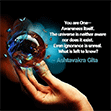 All sorrow comes from fear. From nothing else. When you know this, You become free of it, And desire melts away. You become happy And still. All sorrow comes from fear. From nothing else. When you know this, You become free of it, And desire melts away. You become happy And still.
~ Ashtavakra Gita 11:5
Body, heaven and hell, bondage and freedom, as also fear, all these are mere imagination. What have I to do with all these — I whose nature is Pure Consciousness?
Ashtavakra said:
1.2 To be free, shun the experiences of the senses like poison. Turn your attention to forgiveness, sincerity, kindness, simplicity, truth.
1.3 You are not earth, water, fire or air. Nor are you empty space. Liberation is to know yourself
as Awareness alone, the Witness of these.
1.4 Abide in Awareness with no illusion of person. You will be instantly free and at peace.
Even while distracted the blessed one is still. In meditation, he does not meditate. In ignorance, he remains clear. Though learned,
he knows nothing.
~ Ashtavakra Gita 18.97
His mind has stopped working! It has simply melted away; and, with it, dreams and delusions and dullness. And for what he has become, There is no name.
If you think you are free, You are free.
If you think you are bound, You are bound. For the saying is true: You are what you think.
It is you who pervade this universe, and this universe exists in you. You are truly pure Consciousness by nature. Be not petty-minded.
Let yourself dissolve. You are one and the same in joy and sorrow, hope and despair, life and death. You are already fulfilled.
Meditate on the Self. One without two, Exalted awareness.
Give up the illusion of the separate self.
Give up the feeling, within or without, that you are this or that.
My child, because you think you are the body, for a long time you have been bound. Know you are pure Awareness. With this knowledge as your sword, cut through your chains and be happy!
One who knows for certain that this universe is but an illusion and a nothing, becomes desireless and Pure Intelligence, and finds peace as if nothing exists. In the ocean of the world One only was, is, and will be. You have neither bondage nor liberation. Live contented and happily.
The Self Alone IS "You are the solitary Witness of All That Is, Forever Free. Your only bondage is not seeing this.
The universe is but a thought in Consciousness. In Reality it is nothing. One who sees the true nature of existence and non-existence never ceases to exist. The Self - which is absolute, effortless, timeless, immaculate - is without limits and at no distance from you. You are forever It.
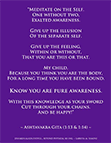 You are pure consciousness, the substance of the universe. The universe exists within you. Don’t be small-minded.
You are pure consciousness, the substance of the universe. The universe exists within you. Don’t be small-minded.
You are the Solitary Witness of All That Is, forever free. Your only bondage is not seeing This.
Your real nature is one perfect, free, and actionless consciousness, the all-pervading, unattached to anything, desireless, at peace. It appears through illusion as the world. Knowing that all this is an illusion, one becomes free from desire, pure receptivity and at peace, as if nothing existed.
You're not the body, nor does the body belong to you. You're neither the doer nor the experiencer. You are Consciousness Itself, the eternal Impersonal Witness. Live in peace.
Avadhuta Gita
 The Avadhuta Gita is attributed to the sage Dattatreya, who spontaneously sang it after purifying himself in meditation and becoming absorbed in the uninterrupted bliss of Reality. It is regarded as one of the greatest treatise on Advaita Vedanta and some scholars date it as far back as 5000 B.C.
The Avadhuta Gita is attributed to the sage Dattatreya, who spontaneously sang it after purifying himself in meditation and becoming absorbed in the uninterrupted bliss of Reality. It is regarded as one of the greatest treatise on Advaita Vedanta and some scholars date it as far back as 5000 B.C.
The word "avadhut" refers to one who has renounced all worldly attachments and connections and lives in a state beyond body consciousness. He has shaken off all cares and concerns, possessions and positions, along with all concepts and labels that interfere with his direct perception of Reality. He holds out no compromise with illusion, he offers no foothold on separation, he allows no semblance of duality at all to creep into his direct perception. He does not identify with his mind or body or "names and forms" and does not recognise a distinction between himself and the world around him. According to Dattatreya, an avadhut need not have any particular appearance, lifestyle, religion or social role. He may walk about naked or be dressed as a prince. He may appear pious or blasphemous, ascetic or hedonistic. Such a person is held to be pure consciousness in human form. He is the ever-free Reality [Brahman].
42. Atman is not purified by the six methods of Yoga. Absence of the mind makes It no clearer. The teachings of a Guru reveal It not. It is all purity, in Itself, by Itself.
47. Pure, pure thou art, without a body, unrelated to the mind, beyond maya; why art thou ashamed to declare: ”I am Atman, the supreme Reality”?
In the Self (Atma) there is neither manhood nor womanhood, because such conceptions cannot exist in Eternity.
My mind, my friend, many words are not needed, and the world hardly comprehends reason. In a word, I have told you the essence of truth: “You are Truth, you are as space."
Bhagavad Gita
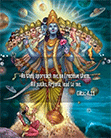 At the hour of death, when a man leaves his body, he must depart with his consciousness absorbed in Me. Then he will be united with Me. Be certain of that. Whatever a man remembers at the last, when he is leaving the body, will be realized by him in the hereafter; because that will be what his mind has most constantly dwelt on, during this life. Therefore you must remember Me at all times, and do your duty. If your mind and heart are set upon Me constantly, you will come to Me. Never doubt this. Make a habit of practicing meditation, and do not let your mind be distracted. In this way you will come finally to the Lord, Who is the light-giver, the highest of the high. At the hour of death, when a man leaves his body, he must depart with his consciousness absorbed in Me. Then he will be united with Me. Be certain of that. Whatever a man remembers at the last, when he is leaving the body, will be realized by him in the hereafter; because that will be what his mind has most constantly dwelt on, during this life. Therefore you must remember Me at all times, and do your duty. If your mind and heart are set upon Me constantly, you will come to Me. Never doubt this. Make a habit of practicing meditation, and do not let your mind be distracted. In this way you will come finally to the Lord, Who is the light-giver, the highest of the high.
~ Bhagavad Gita 8:5-10
 By devotion one truly understands what and who I am in essence. Having known Me in essence, one immediately merges with Me.
By devotion one truly understands what and who I am in essence. Having known Me in essence, one immediately merges with Me.
~ Bhagavad Gita
For one who sees with the eyes of the heart, rather than the senses, the world looks different; the blades of grass, the song of the birds, the drops of dew, all are seen to be none other than the One Life that surrounds us in every moment, proclaiming the Glory of the One. They see the One in every creature and every creature in the One… they see everything with an equal eye.
~ Bhagavad Gita 4:24
He who, before he leaves his body, learns to surmount the promptings of desire and anger is a saint and is happy.
~ Bhagavad Gita
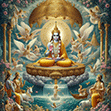 I am the Atma abiding in the heart of all beings. I am also the beginning, the middle, and the end of all beings. If the radiance of a thousand suns were to burst at once into the sky, that would be like the splendor of the Mighty One… I am become Death, the Shatterer of Worlds. I am the Atma abiding in the heart of all beings. I am also the beginning, the middle, and the end of all beings. If the radiance of a thousand suns were to burst at once into the sky, that would be like the splendor of the Mighty One… I am become Death, the Shatterer of Worlds.
~ The Bhagavad Gita
One should gradually, gradually attain quietude with the intellect held steadfast and the mind sunk in the Self, allowing no thought to arise. To whatever side the restless, unsteady mind wanders away, one should check it and bring it back controlled to the Self.
~ Bhagavad Gita
Salvation of the Dawn
Look to this day for it is life, the very life of life.
In its brief course lie all the truths and realities of your existence;
The bliss of growth, the glory of action, and the splendor of beauty;
For yesterday is but a dream and tomorrow is only a vision,
But today well lived makes every yesterday a dream of happiness
And every tomorrow a vision of hope.
Look well, therefore, to this day.
Such is the salvation of the dawn.
~ Bhagavad Gita
Shake off this fever of ignorance. Stop hoping for worldly rewards. Fix your mind on the Atman. Be free from the sense of ego, counsels Krishna. You dream you are the doer, you dream that action is done, you dream that action bears fruit. It is your ignorance, it is the world’s delusion that gives you these dreams. Seek this knowledge and comprehend clearly why you should seek it: such, it is said, are the roots of true wisdom: ignorance, merely, is all that denies them. When men have thrown off their ignorance, they are free from pride and delusion. They have conquered the evil of worldly attachment. They live in constant union with the Atman. All craving has left them. They are no longer at the mercy of opposing sense-reactions. Thus they reach that state which is beyond all change.
~ Bhagavad Gita
The instrument of offering is the One; that which is offered is the One; it is the One who offers the sacrifice in the fire of the One; the One is attained by those who see the One in every action.
~ Bhagavad Gita 6:29
The man who sees me in everything and everything within me will not be lost to me, nor will I ever be lost to him.
~ Bhagavad Gita
These bodies are perishable, but the dwellers in these bodies are eternal, indestructible and impenetrable.
~ Bhagavad Gita
Truly there never was a time when I was not, nor you, nor these lords of men – nor in the future will there be a time when we shall cease to be.
~ Bhagavad Gita 2:12
When meditation is mastered,
The mind is unwavering like the
Flame of a lamp in a windless place.
In the still mind,
In the depths of meditation,
The Self reveals itself.
Beholding the Self
By means of the Self,
An aspirant knows the
Joy and peace of complete fulfillment.
Having attained that
Abiding joy beyond the senses,
Revealed in the stilled mind,
S/He never swerves from the eternal truth.
~ Bhagavad Gita
When you keep thinking about sense objects, attachment comes. Attachment breeds desire, the lust of possession that burns to anger. Anger clouds the judgment; you can no longer learn from past mistakes. Lost is the power to choose between what is wise and what is unwise, and your life is utter waste. But when you move amidst the world of sense, free from attachment/craving (raga) and aversion (dvesha) alike, there comes peace in which all sorrows end, and you live in the wisdom of the Self.
~ Bhagavad Gita (Ch2.62-65)
You must learn to endure fleeting things they come and go!
~ Bhagavad Gita
Ribhu Gita
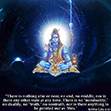 Some may argue that this universe of duality (multiple existences) is a factual second reality,
clearly seen by the senses
operated by the mind.
But then, are the senses anything apart from the mind?
Can they function without the support of the mind in which they are imbedded?
What is this mind except a bundle
of thoughts?
What are thoughts except evanescent ripples in the still, limitless ocean of
pure Being-Awareness-Self,
which is the sole Existence without
a second. Some may argue that this universe of duality (multiple existences) is a factual second reality,
clearly seen by the senses
operated by the mind.
But then, are the senses anything apart from the mind?
Can they function without the support of the mind in which they are imbedded?
What is this mind except a bundle
of thoughts?
What are thoughts except evanescent ripples in the still, limitless ocean of
pure Being-Awareness-Self,
which is the sole Existence without
a second.
~ Ribhu Gita
That which is known as Brahman or The Self is the timeless Truth. It alone is for all eternity, the unalloyed being and non-duality is its nature.
~ from the intro to the Ribhu Gita
The universe was neither born, nor maintained, nor dissolved; this is the plain truth. The basic screen of pure Being-Awareness-Stillness devoid of all the moving shadow pictures of name and form of the universe is the sole, eternal Existence.
~ Ribhu Gita
Lord Krishna
 Lord Krishna said: Lord Krishna said:
Arjuna, abandon all Dharma (duties) and just surrender unto me (the will of God). I shall deliver you from all bonds of Karma. Do not fear.
A person in full consciousness of Me, knowing Me to be the ultimate beneficiary of all sacrifices and austerities, the Supreme Lord of all planets and demigods, and the benefactor and well-wisher of all living entities, attains peace from the pangs of material miseries.
~ SHRI KRISHNA, Bhagavad Gita as it is 5.29
Shri Krishna said:
After being situated in this yoga practice and vibrating the sacred syllable Om, the supreme combination of letters, if one thinks of the Supreme Personality of Godhead and quits his body, he will certainly reach the spiritual planets.
~ Bhagavad Gita as it is 8.13
It is never born, nor does it die: after coming to be, it does not cease to be; it is without birth, eternal, imperishable and timeless; it is not destroyed with the destruction of the body.
- Lord Krishna from the Bhagavad Gita
Shri Krishna said:
O Arjuna, as the Supreme Personality of Godhead, I know everything that has happened in the past, all that is happening in the present, and all things that are yet to come. I also know all living entities; but Me no one knows.
~ ~Bhagavad Gita as it is 7.26
Shri Krishna said:
The Supreme Truth exists outside and inside of all living beings, the moving and the nonmoving. Because He is subtle, He is beyond the power of the material senses to see or to know. Although far, far away, He is also near to all.
Sri Krishna said:
Remembering me at the time of death, close down the doors of the senses and place the mind in the heart.
Then, while absorbed in meditation, focus all energy upwards to the head.
Repeating in this state the divine name, the syllable Om that represents the changeless Brahman,
you will go forth from the body and attain the supreme goal.
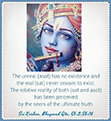 That Light which is residing in the Sun and which illumines the whole world, and that which is in the moon and in the fire - know that Light to be Mine.
That Light which is residing in the Sun and which illumines the whole world, and that which is in the moon and in the fire - know that Light to be Mine.
~ Lord Krishna in Gita 12
There was never a time when I did not exist, nor you. Nor will there be any future when we cease to be.
~ Sri Krishna, Bhagavad Gita
With their minds thus taken up by their own selfish desires for everlasting pleasure and power, they are not able to develop the utter concentration needed to reach union with God, which is mankind’s only real objective.
~ Krishna (Bhagavad Gita)
Some more Krishna sayings:
Death is certain for anyone born, and birth is certain for the dead. Since the cycle is inevitable, you have no cause to grieve.
When he renounces all desires and acts without craving, possessiveness or individuality, he finds peace. This is the place of the infinite spirit. Achieving it, one is freed from delusion. Abiding in it even at the time of death, one finds the pure calm of infinity.
A man cannot escape the force of action by abstaining from actions. He does not attain success just by renunciation.
Knowing the self beyond understanding, sustain the self with the self. Great warrior, kill the enemy menacing you in the form of desire.
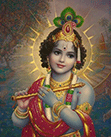 Whenever sacred duty decays and chaos prevails then I create myself, Arjuna. To protect men of virtue and destroy men who do evil, to set the standard of sacred duty I appear in age after age.
Whenever sacred duty decays and chaos prevails then I create myself, Arjuna. To protect men of virtue and destroy men who do evil, to set the standard of sacred duty I appear in age after age.
If you see me in all things and see all things in me, then you will never lose sight of me, and I will never lose sight of you.
|











































